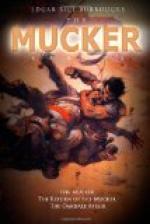A great, mad hope had been surging through his being since he had read of the broken engagement and received the girl’s note. And now in her eyes, in her whole attitude, he could read, as unmistakably as though her lips had formed the words that he had not hoped in vain.
But some strange influence had seemed suddenly to come to work upon him. Even in the brief moment of his entrance into the magnificence of Anthony Harding’s home he had felt a strange little stricture of the throat—a choking, half-suffocating sensation.
The attitude of the servant, the splendor of the furnishings, the stateliness of the great hall, and the apartments opening upon it—all had whispered to him that he did not “belong.”
And now Barbara, clothed in some wondrous foreign creation, belied by her very appearance the expression that suffused her eyes.
No, Billy Byrne, the mucker, did not belong there. Nor ever could he belong, more than Barbara ever could have “belonged” on Grand Avenue. And Billy Byrne knew it now. His heart went cold. The bottom seemed suddenly to have dropped out of his life.
Bravely he had battled to forget this wonderful creature, or, rather, his hopeless love for her—her he could never forget. But the note from her, and the sight of her had but served to rekindle the old fire within his breast.
He thought quickly. His own life or happiness did not count. Nothing counted now but Barbara. He had seen the lovelight in her eyes. He thanked God that he had realized what it all would have meant, before he let her see that he had seen it.
“I’ve been back several months,” he said presently, in answer to her question; “but I got sense enough to stay where I belong. Gee! Wouldn’t I look great comin’ up here buttin’ in, wit youse bunch of highlifes?”
Billy slapped his thigh resoundingly and laughed in stentorian tones that caused the eyebrows of the sensitive Smith on the floor above to elevate in shocked horror.
“Den dere was de mills. I couldn’t break away from me work, could I, to chase a bunch of skirts?”
Barbara felt a qualm of keen disappointment that Billy had fallen again into the old dialect that she had all but eradicated during those days upon distant “Manhattan Island.”
“I wouldn’t o’ come up atal,” he went on, “if I hadn’t o’ read in de poiper how youse an’ Mallory had busted. I t’ought I’d breeze in an’ see wot de trouble was.”
His eyes had been averted, mostly, as he talked. Now he swung suddenly upon her.
“He’s on de square, ain’t he?” he demanded.
“Yes,” said Barbara. She was not quite sure whether to feel offended, or not. But the memory of Billy’s antecedents came to his rescue. Of course he didn’t know that it was such terribly bad form to broach such a subject to her, she thought.
“Well, then,” continued the mucker, “wot’s up? Mallory’s de guy fer youse. Youse loved him or youse wouldn’t have got engaged to him.”




